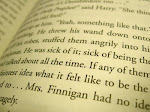
I read this book in perhaps the worst English class I've ever had (or one of the worst- I've had some clunkers). This was my spring semester of sophomore year, in a class with a mediocre teacher, a 7 a.m. start time and a group of kids who just couldn't give a flip about reading. All of that combined made for a hell of a time- emphasis on "hell."
Even with all of that, though, I saw the genius in a work like this dystopian novel of Ray Bradbury's, which focuses on a fireman in the future named Guy Montag, who takes pleasure in his job of burning books until he meets a girl, Clarisse, and a professor named Faber who show him a different world: a world in which people can think for themselves, and books and ideas are prized. Enamored with this new world, he shirks his old life, with damning consequences.
I read this book feverishly and really cherished its message. Perhaps now more than ever I see the parallel between our world in 2010 and the one he envisioned, and I realize what he meant in writing it. Our complete faith, even dependence upon, mass media- television especially, in his eyes- can lead us to become mindless and complacent, and "turn our brains to mush." This concept is illustrated in Fahrenheit 451, particularly in Montag's wife Mildred whose sole preoccupation is with the "family," a perpetual interactive television soap opera she watches. Strangely enough, however, Bradbury also believed that there were too many groups in American society for censorship to be possible.
As it turns out, a great many of those groups advocate for censorship. This book was consequently banned on grounds of offensive language ("God damn!" being the offending phrase, mainly), radical thinking (burning books including the Bible), portrayal of smoking and drinking, and anti-religious and anti-establishment thinking. In fact, Bradbury's own publisher, Ballantine Books, printed an expurgated copy excluding the words "hell," "damn" and "abortion", and this copy ran for ten printings before Bradbury got wind of it and demanded the original copy be reinstated, which it was in 1980. Irony, we have it.
Even with its battles with censorship and banning, this book stands the test of time, and I am very glad I was taught it in high school. It gets you thinking in ways you may never have thought to think before, and if it may scare some along the way- well, it does its job then. I definitely recommend this book.





No comments:
Post a Comment